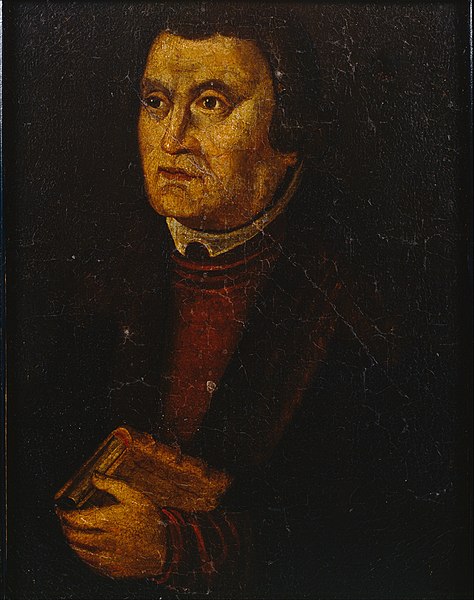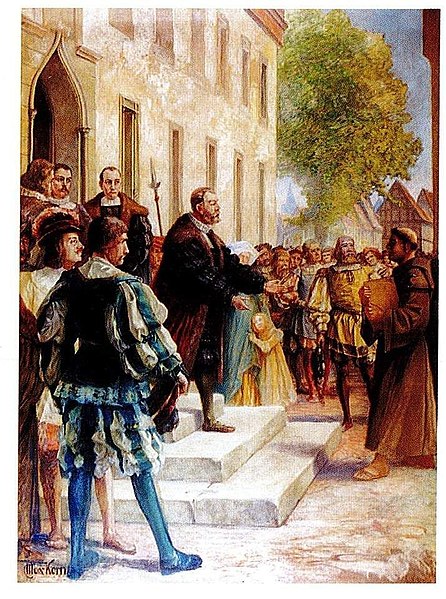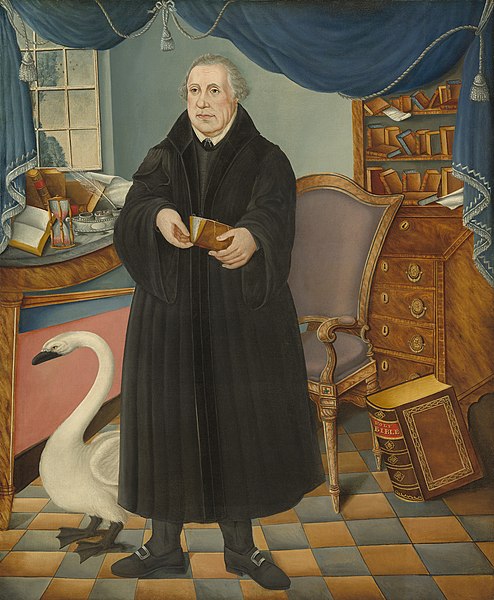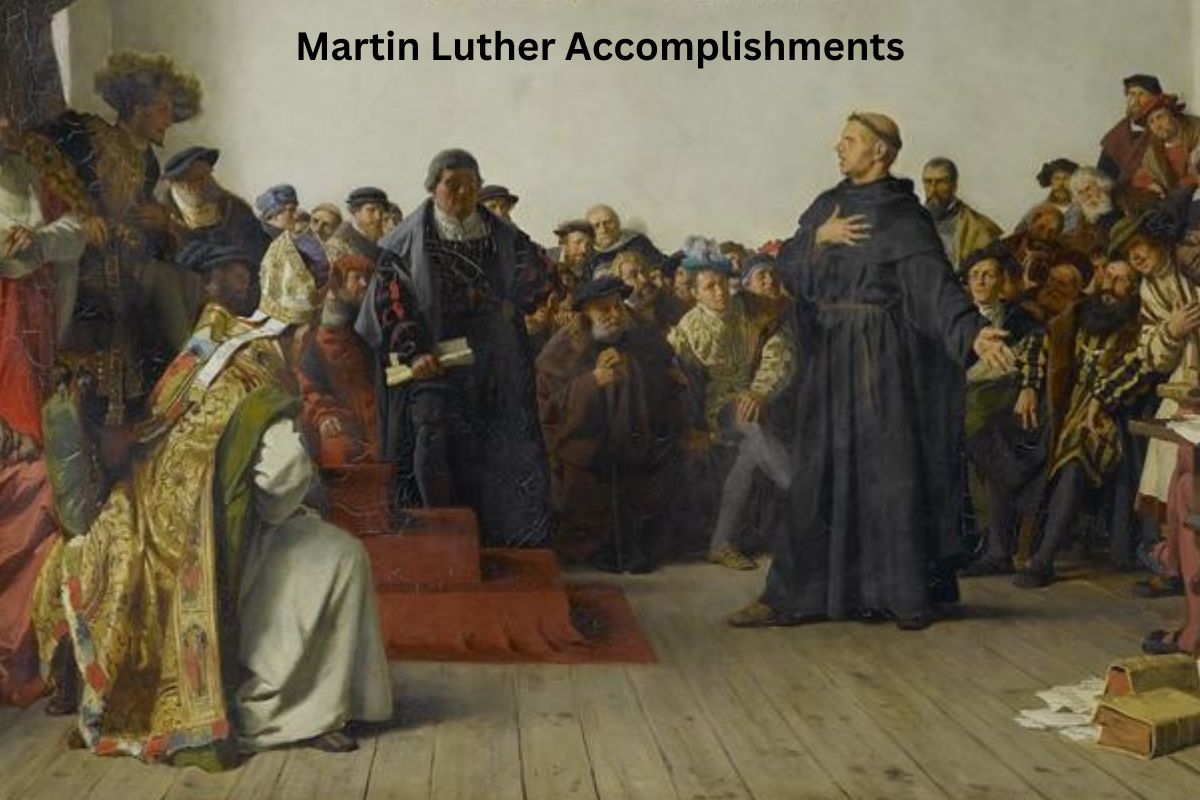Martin Luther (1483-1546) was a German theologian, priest, and key figure in the Protestant Reformation. Born in Eisleben, Germany, Luther became a monk and later a professor of theology at the University of Wittenberg.
In 1517, he famously posted his Ninety-Five Theses, criticizing the Catholic Church’s practices, which sparked the Reformation.
Luther’s teachings emphasized salvation by faith alone and the authority of the Bible, challenging the Catholic Church’s authority. He translated the Bible into German, making it accessible to a broader audience, and founded Lutheranism, a major Protestant denomination.
His influence extended to politics, advocating for the separation of church and state and encouraging individual interpretation of religious texts.
Luther’s actions and ideas reshaped Christianity and left a lasting impact on religious, social, and political thought in Europe and beyond. He passed away in Eisleben in 1546.
Accomplishments of Martin Luther
1. Posting the Ninety-Five Theses (1517)
This event is often regarded as the starting point of the Protestant Reformation. Martin Luther, a Catholic priest and theologian, nailed his Ninety-Five Theses to the door of the Castle Church in Wittenberg, Germany.
Also Read: Facts About Martin Luther
In these theses, he challenged the Catholic Church’s practice of selling indulgences, which were essentially certificates that promised to reduce a person’s time in purgatory. Luther’s intent was to spark an academic debate within the Church about this practice and other theological issues.
However, his actions had far-reaching consequences, as the Ninety-Five Theses were quickly translated and printed, leading to widespread discussion and ultimately a rupture in the Catholic Church.

2. Translating the Bible into German (1522-1534)
One of Luther’s most enduring accomplishments was his translation of the Bible from Latin into German. This monumental task took several years and resulted in the Luther Bible, which made the Scriptures accessible to a broader audience.
Prior to this translation, the Bible was primarily available in Latin, a language understood by only the educated elite and clergy.
Also Read: Timeline of Martin Luther
Luther’s translation not only allowed ordinary people to read and understand the Bible in their native language but also had a profound impact on the development of the German language itself.
It became a standard reference and played a pivotal role in the spread of Protestantism throughout German-speaking regions.
3. Founding Protestantism
Martin Luther’s theological writings and teachings formed the foundation of the Protestant movement. He articulated key Protestant principles, such as salvation by faith alone (sola fide) and the authority of the Bible alone (sola scriptura).
These ideas challenged traditional Catholic doctrine, which emphasized the role of good works and the authority of the Church. Luther’s teachings attracted followers and eventually led to the establishment of various Protestant denominations.
Lutheranism, in particular, emerged as a distinct branch of Protestantism, with its own doctrinal beliefs and practices.
The Protestant Reformation, sparked by Luther’s actions and ideas, resulted in the division of Western Christianity into Catholic and Protestant branches and significantly reshaped religious life in Europe and beyond.
4. Establishing Lutheranism
Martin Luther’s theological writings and teachings not only laid the groundwork for the broader Protestant movement but also gave rise to Lutheranism, a major Protestant denomination.
Luther’s followers and supporters, often referred to as Lutherans, organized themselves into distinct congregations and churches. Lutheranism became particularly influential in parts of Germany and Scandinavia, where it was often adopted as the state religion.
The Lutheran Church developed its own liturgical practices and doctrines, with an emphasis on the authority of the Bible and justification by faith alone. Lutheranism remains a significant Christian denomination today, with millions of adherents worldwide.

5. Reforming worship practices
Luther’s criticism of what he considered corrupt practices within the Catholic Church led to significant changes in worship and religious rituals. He advocated for simplifying liturgical ceremonies and returning to what he saw as the fundamental elements of Christian worship.
This emphasis on simplicity in worship services became a hallmark of early Lutheran congregations. Luther also introduced congregational singing in the vernacular, with hymns and songs in German that allowed the laity to actively participate in worship.
His reforms in worship aimed to create a more direct and personal connection between believers and God, which was central to the Protestant ethos.
6. Promoting education for all
Martin Luther believed that education should be accessible to all, not just the clergy and the elite. He played a crucial role in advancing education by establishing schools and universities.
Notably, he founded the University of Wittenberg in 1502, where he later taught theology. Luther’s support for education had a profound impact on the spread of literacy and the development of intellectual thought in the regions influenced by the Reformation.
The idea that education should be accessible to all eventually contributed to the growth of public education systems in many Protestant countries.
7. Influence on the Peasants’ Revolt (1524-1525)
While Martin Luther did not lead the Peasants’ Revolt, his writings and ideas played a role in its development. The revolt was a widespread uprising of peasants across German-speaking territories who were seeking economic and social reforms.
Some peasants invoked Luther’s teachings on spiritual equality and justice as they demanded greater rights and relief from oppressive feudal conditions. However, Luther did not support the violent tactics of the revolt, and he published pamphlets condemning the rebellion.
His stance on the Peasants’ Revolt highlighted his complex relationship with social and political change, as he generally supported reform but was cautious about radical upheaval.

8. Setting an example for clergy marriage
Martin Luther’s own marriage to Katharina von Bora in 1525 was a significant moment in the history of the Protestant Reformation. By marrying as a former Catholic monk, Luther challenged the Catholic Church’s requirement of celibacy for clergy.
Luther and Katharina’s marriage became a model for other clergy members who wished to marry and have families, and it contributed to the broader Protestant acceptance of clergy marriage. This practice continues in many Protestant denominations today.
9. Political influence
Martin Luther’s ideas had a profound impact on the political landscape of his time. His doctrine of the “two kingdoms” – the idea that God rules both the earthly and spiritual realms separately – had implications for the relationship between church and state.
Many rulers, particularly in northern Europe, saw in Luther’s teachings an opportunity to assert greater autonomy from the authority of the Catholic Church and the Pope. They also recognized the potential for centralized control over religious matters within their own territories.
This led to the formation of Protestant territories and states, where the ruler often determined the religious practices of their subjects.
10. Legacy of religious freedom
Martin Luther’s contributions to the Reformation, such as his emphasis on individual conscience and the authority of the Bible, laid the groundwork for broader ideas about religious freedom.
By challenging the ecclesiastical authority of the Catholic Church and encouraging individuals to interpret Scripture for themselves, Luther unintentionally contributed to the concept that individuals have the right to practice their faith according to their own beliefs.
His writings and teachings on the freedom of the Christian led to the development of the idea that religious convictions should be protected and not subject to coercion, a principle that became integral to the development of religious liberty in modern democracies.
